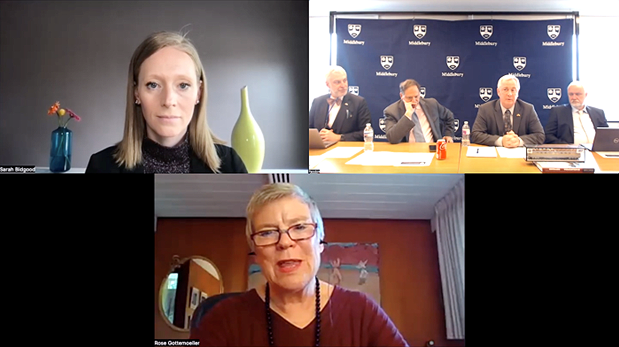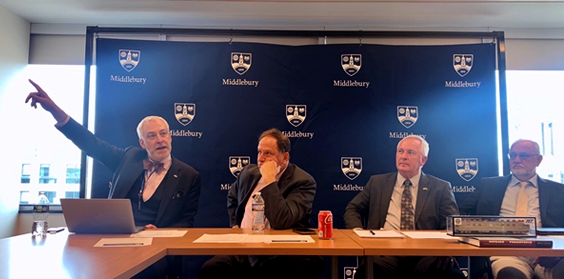April 28, 2023
Sarah Bidgood, Miles Pomper, and Nikolai Sokov
View the recording of the event.
On April 14, 2023, the Washington DC office of the James Martin Center for Nonproliferation Studies (CNS) hosted “Russian Nuclear Weapons in Belarus? A CNS Roundtable Discussion” hybrid event. The roundtable event focused on the implications of President Vladimir Putin’s March 25 announcement that Russia will deploy some of its tactical nuclear warheads to Belarus.
Former NATO Deputy Secretary General Rose Gottemoeller provided an introduction to the event which featured a panel of four speakers: William Alberque, Director of Strategy, Technology, and Arms Control at the International Institute for Strategic Studies in Berlin; Sarah Bidgood, Director of the CNS Eurasia Program; CNS Consultant William Moon; and Nikolai Sokov, Senior Fellow at the Vienna Center for Disarmament and Nonproliferation, with CNS Senior Fellow Miles Pomper serving as both the host of the event and the panel moderator.
Gottemoeller noted that Russia’s plan to deploy nuclear weapons in Belarus “…clearly contradicts the commitments that Belarus and Russia made under the trilateral statement in 1994 that all nuclear weapons in Belarus would be moved to Russia for redeployment or elimination and that Belarus would embrace the status of a non-Nuclear weapons State under the Nonproliferation Treaty.” Gottemoeller also suggested that “While the Russian action is regrettable, this would be a good opportunity, I think, to follow up on a recent proposal by Senator Sam Nunn and Dr. Earnest Moniz of NTI…They have proposed to have a US-Russia dialogue on fail-safe mechanisms.”
Sokov followed Gottemoller’s opening remarks by delving into the background leading up to Putin’s decision to build storage bunkers for warheads and train troops from Belarus to use them either with air-launched or ground-launched systems. Sokov said that the planned deployment was likely aimed at Poland which borders Belarus to the West. Poland has been one of the strongest champions of assistance to Ukraine in its conflict with Russia and has been particularly forceful about the need to change Russia’s political regime in Russia because of the invasion. More broadly, the action formed part of a general strategy of attempting to deter Western intervention in the war. “The Russians will try to leverage their nuclear weapons but not actually use them,” said Sokov. He also noted that this was the first time in several decades that Russia had given shorter-range systems a clear military mission.
Moon, who spent decades working closely with Russia’s forces to dismantle former Soviet nuclear weapons as part of the Defense Threat Reduction Agency (DTRA) described the steps Russian forces would likely carry out if Putin follows through with an order to actually transfer the nuclear weapons to Belarus. This includes providing security for any deployed warheads, such as triple fencing and ample security systems, as well as accommodations for the Russians staffing these facilities. If and when the transfer of the nuclear weapons occurs, Moon believes that there will be significant indications of the location of the storage facilities and its progress.
The audience attending the event in the office also enjoyed a model of the guard car train used for transporting nuclear weapons brought in by William Moon.
Alberque added to Moon’s insights by using geospatial and other analysis to attempt to pinpoint potential deployment locations and rail routes to transport the weapons from Russian central storage sites to those locations (likely the Lida Air Base and the 465th Missile Brigade. Alberque also touched on how NATO Allies will react to Putin’s announcement, indicating that Allies might react to the new vulnerabilities posed by these potential Russian deployments.
Bidgood closed out the presentations by discussing how nuclear Nonproliferation Treaty (NPT) state-parties, particularly China might react to Putin’s announcement, particularly as the initial preparatory meeting for the next NPT Review Conference is coming up in August. Despite Russia receiving China’s support throughout its invasion of Ukraine, “[China] also opposes the deployment of nuclear weapons abroad and believes that nuclear weapons states should withdraw nuclear weapons deployed outside of their territory,” said Bidgood. Bidgood said however that it is unclear whether China and others would voice their disapproval should the Russian plans to deploy nuclear weapons in Belarus materialize. Certainly, she said the issue will be disruptive and challenging in the NPT process at a time where there is no shortage of other challenges.
Following the presentations, Pomper moderated a discussion with the expert audience for the event both in-person and online.
View the recording of the event.
.